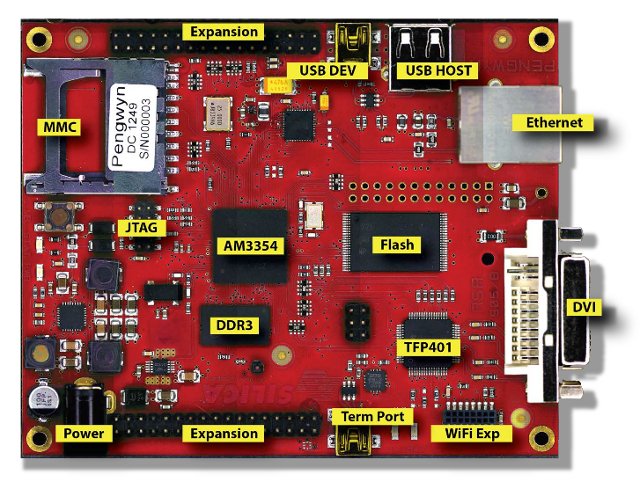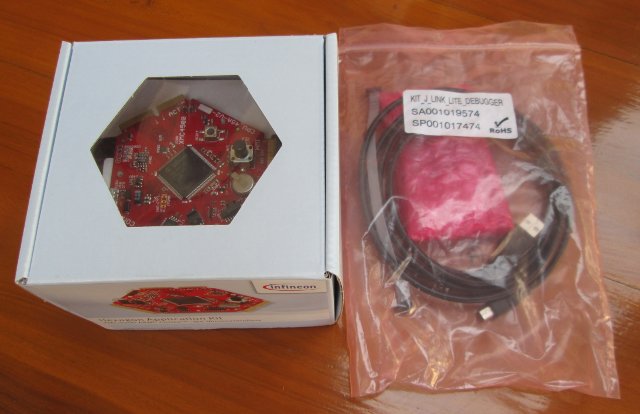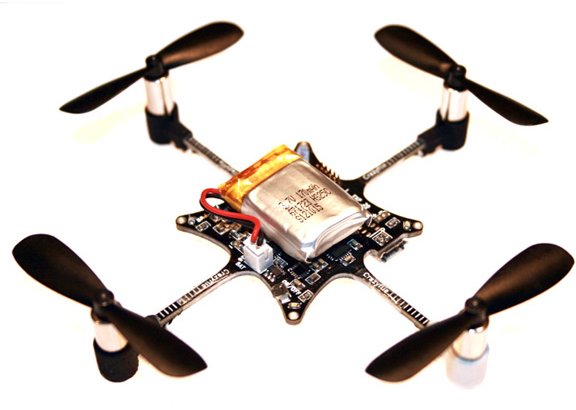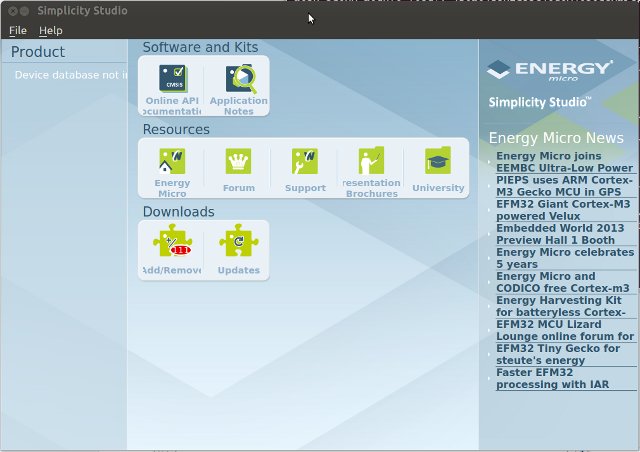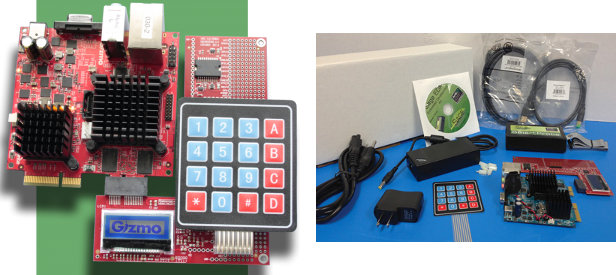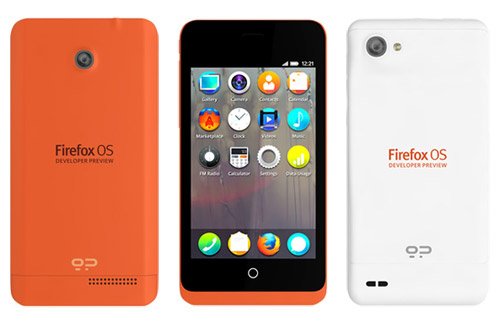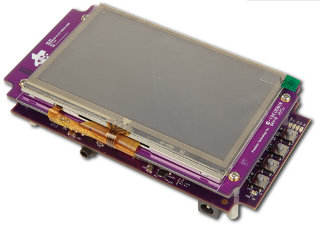At the end of January, SILICA, an Avnet subsidiary, announced the Pengwyn, a single board computer based on Texas Instruments Sitara AM3354 Cortex A8 processor. The board targets industrial customers, and the company promotes it as “an open platform to develop applications under Linux or Windows Embedded operating systems”. Here are the specifications of the Pengwyn board: Texas Instruments Sitara AM 3354 ARM Cortex-A8 MCU @ 720 MHz System Memory – 256 MB DDR3 Storage – 1 GB Nand Flash, 32 MB SPI Flash Memory, and microSD slot (if not used with Wi-Fi/Bt modules) Connectivity and expandability USB Host and Device Ports RJ-45 Ethernet Port Connector for optional 1 GB Ethernet Port 2x connectors for generic expansions modules SDIO/MMC Port (can be used for optional WI-FI/bluetooth modules) DVI Display Port Silica will provide Linux (Arago Project, an OpenEmbedded based Distribution) and Windows Embedded Compact 7 BSP and images, as well as […]
Infineon Hexagon Application Kit (XMC4500 Enterprise Edition) Overview and Quick Start Guide
A few months ago, Infineon sent me XMC4500 Relax Lite Kit for review, and I wrote a short Getting Started Guide about this 10 Euros Cortex M4 devkit. This month, I’ve received another XMC4500 kit with more features and expansion abilities: XMC4500 Enterprise Edition which is one of their Hexagon Application Kit. I received two packages: CPU Board XMC4500 General Purpose (CPU_45A-V2) with accessories (55 Euros) – This is what you get when you order to Basic Kit. J-Link Lite Cortex-M Debugger (40 Euros) Let’s open the packages and see what’s inside. In the first package, we’ve got XMC4500 CPU board, a pin extension board that can be used on any of the 3 extension connectors of the CPU board to access the signals easily, and a microUSB to USB cable for power. The JLink debugger comes with a 10-pin ribbon cable, and a microUSB to USB cable to connect to the […]
Crazyflie Nano Quadcopter Open Source Development Kit
If you can’t wait until 2014 to get the MeCam, Seeedstudio has something for you: The Crazyflie Nano Quadcopter, which looks similar to the MeCam, but does not feature a camera, its control board is powered by STM32F103CB MCU @ 72 MHz with 128kb flash and 20kb RAM (so, no it won’t run Linux), and at $173 the price is significantly higher. Here are Crazyflie key features: Small and lightweight, around 19g and about 90mm motor to motor Flight time up to 7 minutes with standard 170mAh Li-Po battery Standard micro-USB connector for charging which takes ~20min for the stock 170mAh Li-Po battery On-board low-energy radio@1mW based on the nRF24L01+ chip. Up to 80m range (environment dependent) when using the Crazyradio 2.4 GHz USB dongle Radio bootloader which enabled wireless update of the firmware 32 bit Cortex M3 MCU: STM32F103CB @ 72 MHz (128kb flash, 20kb RAM) 3-axis high-performance MEMs […]
ARM MCU Development in Linux with Energy Micro’s Simplicity Studio, Eclipse, and CodeSourcery Toolchain
Quite a few months ago, I received an Energy Micro EFM32 Tiny Gecko Starter Kit, but I haven’t done much with it. But recently I saw a tweet from EnergyMicro about Simplicity Studio supports for Ubuntu, and I know it can be problematic to find proper tools for ARM MCU development in Linux, so I decided to give it a try. The first part is about Simplicity Studio, and energyAwareTools which are specific to Energy Micro, but the second part deals with setting up Eclipse and CodeSourcery ARM toolchain for MCU development which should be reusable for other MCUs from vendors such as Texas Instruments, NXP and STMicro. I’ve used a PC running Ubuntu 12.04 64-bit with the instructions below. Installing Simplicity Studio and energyAwareTools in Ubuntu Simplicity Studio is part of the 4 steps of the getting started guide with EFM32 MCUs. It has been available for Linux for […]
$199 Gizmo Explorer Kit Powered by AMD G-Series APU is Now Officially Available
Back in November, I came across the Gizmo Explorer Kit, an embedded development platform based on AMD G-Series G-T40E dual core APU that includes the development board itself (Gizmo Board), two expansion I/O boards, Sage SmartProbe JTAG development tool, some accessories such as cables and power supply, and a DVD with the documentation and SDK. Today, Sage Electronic, Texas Multicore Technologies, and Viosoft officially launched GizmoSphere community that aims at “fostering innovation and development for x86-based embedded Accelerated Processing Units (APUs), and driving and enabling technology projects of interest to independent developers with a focus on stimulating and encouraging innovation for existing and new applications that leverage APUs”. To help with this initiative, they also produce the Gizmo Board, and corresponding Gizmo Explorer Kit, a development board that boots with coreboot, and can run a variety of operating systems such as Android, Linux, Windows, and other RTOS. You can refer to […]
Mozilla Unveils Firefox OS Developer Preview Phones
Mozilla has just announced an entry level developer phone for Firefox OS based on a Qualcomm Snapdragon S1 processor, 512 MB RAM, and 4GB Flash. You may think the specs are quite poor, but this actually makes sense since Firefox OS is initially destined at emerging markets. Here are the full specifications of this smartphone (Codenamed Keon): CPU – Qualcomm Snapdragon S1 1Ghz System Memory – 512 MB RAM Storage – 4GB Flash + microSD slot Display – 3.5″ HVGA Multitouch Network – UMTS 2100/1900/900 (3G HSPA), GSM 850/900/1800/1900 (2G EDGE) Camera – 3 MP rear camera Misc – Wifi N, Light and proxmity Sensor, G-Sensor, GPS, MicroUSB Battery – 1580 mAh The phone supports over the air updates, and comes unlocked, so you can simply add your own SIM card. These developer phones are being developed by Geeksphone in partnership with Telefonica. If you don’t have the developer phone […]
$159 CuBox Pro: Open Source Development Platform Based on Marvell ARMADA SoC
Back in 2011, SolidRun unveiled the CuBox, a miniature open source development platform based on Marvell Armada 510 SoC (88AP510) and aimed at applications such as multimedia, set-top-box, network attached storage (NAS), thin client, digital signage, automation… SolidRun has now announced an upgraded version called CuBox Pro based on the same platform but with 2 GB RAM, and a redesigned casing. Here are the specifications of this development platform: Marvell Armada 510 SoC – 800 MHz dual issue ARM PJ4 processor, VFPv3, wmmx SIMD and 512KB L2 cache. 2GByte DDR3 at 800MHz 1080p Video Decode Engine OpenGL ES 2.0 graphic engine HDMI 1080p Output (with CEC function) Gigabit Ethernet, SPDIF (optical audio), eSata 3Gbps, 2xUSB 2.0, micro-SD, micro-USB (console) Standard Infra-red receiver for 38KHz based IR controllers. No JTAG required. Unbrickable for Developers (i.e. you can’t brick the device to the point you have to physically remove the flash, burn it […]
$66.75 Beaglebone and Other Development Boards Xmas Deals
I’ve come across Xmas deals for uCLinux, Linux and Android development boards & kits by Texas instruments and Emcraft Systems. TI offers 25% discount off five Sitara Linux/Android development kits purchased via Ti e-Store: AM3359 Industrial Development Kit – A full-featured application development platform for evaluating the capabilities and features of Sitara AM335x ARM Cortex-A8 Processors for industrial applications. AM335x processors integrate industrial communication standards that work on Ethernet, CAN, and RS-485 physical layers. Regular price: $895 AM335x Starter Kit – Low-cost development platform based on AM335x ARM Cortex-A8 processor with multiple communication options such as Dual Gigabit Ethernet, WiFi and Bluetooth connectivity, as well as a 4.3″ LCD Touchcreen (resistive). Regular price: $199 AM3359 Industrial Communications Engine (ICE) – Low cost development platform targeted for systems that specifically focus on the industrial communications capabilities of the Sitara AM335x ARM Cortex-A8 Processors. Regular price: $99 Beaglebone – Low-cost, community-supported development […]


